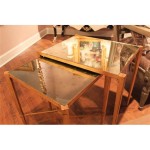Can You Screen Mirror From A Phone To Laptop?
Screen mirroring, the ability to wirelessly display a phone's screen on a larger display like a laptop, offers numerous advantages. From presentations and demonstrations to gaming and media sharing, screen mirroring bridges the gap between mobile devices and computers. This article explores the potential for screen mirroring from a phone to a laptop, examining the available methods and the compatibility factors involved.
Several technologies facilitate screen mirroring. Miracast, a peer-to-peer wireless screencasting standard, allows devices to discover and connect directly, bypassing the need for a Wi-Fi network. Another popular method utilizes DLNA (Digital Living Network Alliance), a standard that enables sharing of media between devices over a home network. Furthermore, some manufacturers offer proprietary screen mirroring solutions, like Apple's AirPlay, which streams content from Apple devices to compatible receivers.
Operating systems play a crucial role in screen mirroring compatibility. Windows 10 and 11 offer native Miracast support, allowing users to project their Android phone screens to their laptops. This functionality can be accessed through the "Connect" app pre-installed on Windows machines. Conversely, mirroring from an iPhone to a Windows laptop requires third-party applications, as AirPlay is not natively supported. Numerous applications available on the Microsoft Store bridge this gap, providing AirPlay receiver functionality on Windows laptops.
ChromeOS, Google's operating system for Chromebooks, also supports screen mirroring, primarily through the built-in Chromecast functionality. Android devices can seamlessly cast their screens to Chromebooks, making presentations and media sharing straightforward. Mirroring an iPhone to a Chromebook is also achievable using third-party extensions available on the Chrome Web Store. These extensions often implement AirPlay receiver capabilities, allowing users to mirror their iOS devices.
macOS, Apple's operating system for Mac computers, offers robust support for AirPlay, enabling streamlined screen mirroring from iPhones and iPads. Users can simply select their Mac as an AirPlay receiver from their iOS device's Control Center. Mirroring an Android device to a Mac requires third-party applications that act as AirPlay receivers or utilize alternative protocols like Miracast.
Several factors can influence the success and performance of screen mirroring. A stable network connection, whether direct via Miracast or through a Wi-Fi network, is crucial for a smooth, lag-free experience. Network congestion can introduce latency and degrade the quality of the mirrored display. Furthermore, the hardware capabilities of both the sending and receiving devices impact performance. Older devices may struggle to maintain a consistent connection or display high-resolution content.
Different operating systems and devices support varying levels of interaction. While some configurations allow for controlling the phone from the laptop’s screen, others may only mirror the display. This interactive functionality, often referred to as "control mode," is particularly useful for presentations, allowing users to control their phone's content directly from their laptop.
Beyond the built-in functionalities and third-party applications, several hardware solutions facilitate screen mirroring. Devices like Chromecast and Apple TV create a dedicated wireless display receiver connected to a television or monitor. These devices can receive mirrored content from phones, effectively extending screen mirroring capabilities to larger screens.
Selecting the appropriate method for screen mirroring depends heavily on the devices involved and the specific use case. For mirroring an Android device to a Windows laptop, the native Miracast support provides a convenient solution. Conversely, mirroring an iPhone to a Windows laptop necessitates a third-party AirPlay receiver application. Users should research the available options and select the method that best suits their needs and device compatibility.
Screen mirroring offers a versatile tool for sharing and displaying mobile content on a larger screen. The availability of various technologies and applications caters to different operating systems and device combinations. While compatibility considerations and network conditions play a role, screen mirroring continues to evolve, providing increasingly seamless integration between phones and laptops.
Understanding the specific capabilities and limitations of the chosen method ensures optimal performance and a positive user experience. Factors such as network stability, device hardware, and the chosen software play crucial roles in achieving a smooth and responsive mirrored display.
As technology progresses, wireless connectivity and screen mirroring functionalities continue to improve. Future developments promise even more seamless and intuitive experiences, further bridging the gap between mobile and desktop computing environments.

How To Mirror Your Android Screen Pc Laptop

How To Mirror Screen From Mobile Laptop Or Pc

How To Mirror Your Iphone Screen On A Computer Pcmag

How To View Phone Screen On Laptop Using Usb Mirroring In Hindi

Solved How Do I Mirror Phone Screen To My Browser

5 Ways To Screen Mirror Android Pc Or Laptop New Tech World

How To Mirror Iphone Windows Pc Laptop Mac Full Guide

Solved How To Mirror Phone Laptop With Without App

How To See Your Phone Screen On Laptop

How To Share Mobile Screen On Laptop Windows 11 Cast








